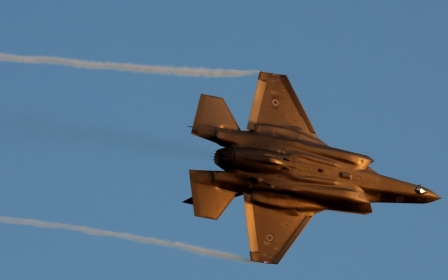US says no system in place to track delivery of spare parts for Israeli F-35s

No system currently exists to stop the flow of spare parts for Israeli F-35 fighter jets from a US-maintained international supply pool, even if courts rule that such a move is necessary due to concerns about war crimes, the US Department of Defense has admitted.
Legal cases in four countries - the UK, the Netherlands, Denmark and Canada - are challenging governments over the continued licensing of arms exports to Israel, including components for the F-35 manufactured in their countries.
Israel has used the F-35, described by its American manufacturer Lockheed Martin as "the most lethal" fighter jet in the world, extensively in its nearly year-long offensive in Gaza, in which over 41,000 people have been killed.
F-35 parts made in the UK and in the Netherlands, as well as parts stored at a Dutch distribution hub, have been suspended from direct export to Israel.
However, the British and Dutch governments have argued that suspending parts going to third countries, but ultimately destined for Israel, would impact the global supply chain because those parts are difficult, if not impossible, to trace.
New MEE newsletter: Jerusalem Dispatch
Sign up to get the latest insights and analysis on Israel-Palestine, alongside Turkey Unpacked and other MEE newsletters
Arms control experts and litigants in the legal challenges have told Middle East Eye that, given the way the F-35's "just-in-time" supply chain operates, components made in their countries that are set to go to Israel via third states should be possible to track - and therefore possible to suspend.
However, in response to questions from MEE, a spokesperson for the F-35 Joint Program Office (JPO) said on Friday that while maintaining accountability for parts is "essential to ensure prudent management of F-35 financial and operational resources", there is currently no system in place to ensure that parts made in one country do not end up in another.
"Most F-35 parts are part of a global spares pool procured for the benefit of all F-35 customers," said Russell Goemaere, spokesperson for the office run by the Department of Defense, in a statement.
"Parts in this global pool are not designated for any designated end user as they are procured and are instead issued and distributed to our customers based on demand and prioritization, when needed."
He added: "While the F-35 supply chain is capable of controlling material movement based on part number/configuration, no current system, process or business rule is in place to filter out or stop the movement of specific serial numbered material to any specific country based on its country of origin."
The admission follows an investigation by MEE into the complex international supply chain supporting the F-35 programme and the legal challenges in several countries surrounding the continued sale of weapons and military equipment to Israel.
Arms control experts said on Friday that the F-35 programme's current inability to track components made in specific countries to their end users was problematic for ensuring that parts do not end up with potential human rights violators.
They also wondered whether the comment about there being "no current system" in place suggested that, in fact, it was a matter of will rather than feasibility.
Anna Stavrianakis, professor of international relations at the University of Sussex and director of research and strategy at the UK-based Shadow World Investigations, said the Department of Defense was "paying lip service to the notion of accountability without putting into place any practices to actually exercise it".
"To say there is no system, process or rule to stop the transfer of parts, but also that the supply chain is capable of controlling the movement of parts, is an acknowledgment that the US [Department of Defense] does not have the will to stop weapons parts reaching Israel," she said.
Kelsey Gallagher, a researcher at the Canadian NGO Project Ploughshares, said governments have a responsibility to ensure that their domestically produced technology is not used in human rights violations.
“Leaving this up to the government of the United States is not doing anyone favours,” Gallagher said.
Under the Arms Trade Treaty, to which the UK, the Netherlands, Canada and Denmark are all parties, arms exports - including components - must be vetted on a case-by-case basis, he added.
“Leaving it up to the authorities in a foreign state does not reflect those obligations,” Gallagher said.
Gerard Jonkman, director of the Rights Forum, one of three Dutch NGOs challenging their government in The Hague over arms exports to Israel, previously told MEE that implementing such a system should be a matter of legal necessity.
“If your logistical system is not able to cope with international law, then you have to find a way to change your logistical system,” Jonkman said.
Middle East Eye delivers independent and unrivalled coverage and analysis of the Middle East, North Africa and beyond. To learn more about republishing this content and the associated fees, please fill out this form. More about MEE can be found here.




